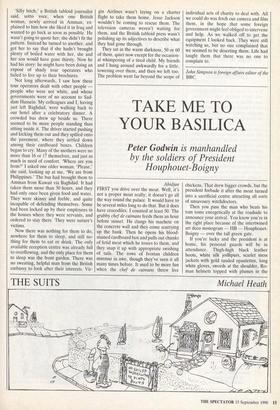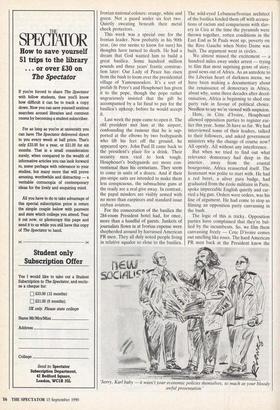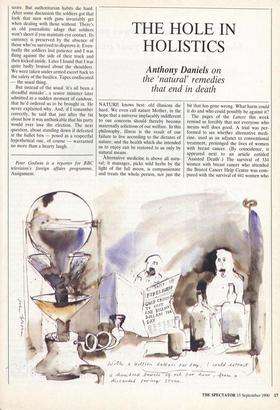TAKE ME TO YOUR BASILICA
Peter Godwin is manhandled
by the soldiers of President Houphouet-Boigny
Abidjan FIRST you drive over the moat. Well, it's not a proper moat really; it doesn't go all the way round the palace. It would have to be several miles long to do that. But it does have crocodiles. I counted at least 50. The grubby chef de caimans feeds them an hour before sunset. He clangs his machete on the concrete wall and they come scurrying up the bank. Then he opens his blood- stained cardboard box and pulls out chunks of fetid meat which he tosses to them, and they snap it up with appropriate swishing of tails. The rows of Ivorian children murmur in awe, though they've seen it all many times before. It used to be more fun when the chef de caimans threw live
chickens. That drew bigger crowds, but the president forbade it after the moat turned into a sacrificial centre attracting all sorts of unsavoury witchdoctors.
Then you pass the man who beats his tom toms energetically at the roadside to announce your arrival. You know you're in the right place becasue of the intertwined art deco monogram — HB — Houphouet- Boigny — over the tall green gate.
If you're lucky and the president is at home, his personal guards will be in attendance. Thigh-high black leather boots, white silk jodhpurs, scarlet mess jackets with gold tassled epaulettes, long white gloves, swords at the shoulder, Ro- man helmets topped with plumes in the Ivorian national colours: orange, white and green. Not a guard under six feet two. Quietly sweating beneath their metal cheek protectors.
This week was a special one for the Ivorian leader. Now probably in his 90th year, (no one seems to know for sure) his thoughts have turned to death. He had a dream that God wanted him to build a great basilica. Some hundred million pounds and three years' frantic construc- tion later: Our Lady of Peace has risen from the bush to loom over the presidential village of Yamoussoukro. It's a sort of prefab St Peter's and Houphouet has given it to the pope, though the pope rather ungraciously insisted that the gift be accompanied by a fat fund to pay for the basilica's upkeep, before he would accept it.
Last week the pope came to open it. The old president met him at the airport, confounding the rumour that he is sup- ported at the elbows by two bodyguards who lift his feet off the ground, he appeared spry. John Paul II came back to the president's place for a drink. Their security men vied to look tough. Houphouet's bodyguards are more con- ventional than his centurians. They seem to come in units of a dozen. And if their pin-stripe suits are intended to make them less conspicuous, the submachine guns at the ready are a real give away. In contrast, the papal minders are visibly armed with no more than earpieces and standard issue rayban aviators.
For the consecration of the basilica the 284-room President hotel had, for once, more than a handful of guests. Junkets of journalists flown in at Ivorian expense were shepherded around by harrassed American PR men. They all duly noted people living in relative squalor so close to the basilica. The wild-eyed Lebanese/Ivorian architect of the basilica fended them off with accusa- tions of racism and comparisons with slav- ery in Ciza at the time the pyramids were thrown together, rotten conditions in the East End as St Pauls went up, poverty on the Rive Gauche when Notre Dame was built. The argument went in circles.
We almost missed the excitement — a hundred miles away under arrest — trying to film that most suprising genre of story; good news out of Africa. As an antedote to the Liberian heart of darkness menu, we have been making a documentary about the renaissance of democracy in Africa, about why, some three decades after decol- onisation, Africa is beginning to shed one party rule in favour of political choice. Needless to say we're viewed with suspicion.
Here, in C6te d'Ivoire, Houphouet allowed opposition parties to register ear- lier this year. Some 26 have so far. We had interviewed some of their leaders, talked to their followers, and asked government ministers why the change of course now? All openly. All without any interference.
But when we tried to find out what relevance democracy had deep in the interior, away from the coastal bourgeoisie, Africa reasserted itself. The lieutenant was polite to start with. He had a red beret, a silver para badge, had graduated from the ecole militaire in Paris, spoke impeccable English quietly and car- ried a big gun. Orders were orders, was his line of argument. He had come to stop us filming an opposition party canvassing in the bush.
The logic of this is tricky. Opposition parties have complained that they're bul- lied by the incumbents. So, we film them canvassing freely — Cote D'ivoire comes out smelling like roses. The hard American PR men back at the President knew the
'Sorry, Karl baby — it wasn't your economic policies themselves, so much as your bloody awful presentation.' score. But authoritarian habits die hard. After some discussion the soldiers got that look that men with guns invariably get when dealing with those without. There's an old journalistic adage that soldiers won't shoot if you maintain eye contact. Its currency is preserved by the absence of those who've survived to disprove it. Even- tually the soldiers lost patience and I was flung against the side of their truck and then kicked inside. Later I found that I was quite badly bruised about the shoulders. We were taken under armed escort back to the safety of the basilica. Tapes confiscated — the usual thing.
But instead of the usual 'it's all been a dreadful mistake', a senior minister later admitted in a sudden moment of candour, that he'd ordered us to be brought in. He never explained why. And, if I remember correctly, he said that just after the bit about how it was unthinkable that his party would ever lose the election. The next question, about standing down if defeated at the ballot box — posed as a respectful hypothetical one, of course — warranted no more than a hearty laugh.
Peter Godwin is a reporter for BBC television's foreign affairs programme, Assignment.




























































 Previous page
Previous page